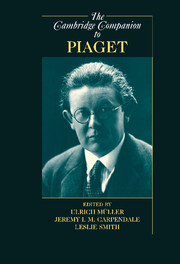Book contents
- Frontmatter
- 1 Introduction: Overview
- 2 The Historical Context Of Piaget’s Ideas
- 3 Piaget’s Developmental Epistemology
- 4 Piaget’s Biology
- 5 On the Concept(s) of the Social in Piaget
- 6 Piaget on Equilibration
- 7 Constructive Processes: Abstraction, Generalization, and Dialectics
- 8 Piaget and Method
- 9 Infancy
- 10 Childhood
- 11 Adolescence
- 12 Piaget’s Theory of Moral Development
- 13 Piaget’s Enduring Contribution to a Science of Consciousness
- 14 Piaget and Affectivity
- 15 Piaget’s Pedagogy
- 16 Piaget in the United States, 1925-1971
- 17 The Mind’s Staircase Revised
- 18 Dynamic Development: A Neo-Piagetian Approach
- Index
3 - Piaget’s Developmental Epistemology
Published online by Cambridge University Press: 28 March 2010
- Frontmatter
- 1 Introduction: Overview
- 2 The Historical Context Of Piaget’s Ideas
- 3 Piaget’s Developmental Epistemology
- 4 Piaget’s Biology
- 5 On the Concept(s) of the Social in Piaget
- 6 Piaget on Equilibration
- 7 Constructive Processes: Abstraction, Generalization, and Dialectics
- 8 Piaget and Method
- 9 Infancy
- 10 Childhood
- 11 Adolescence
- 12 Piaget’s Theory of Moral Development
- 13 Piaget’s Enduring Contribution to a Science of Consciousness
- 14 Piaget and Affectivity
- 15 Piaget’s Pedagogy
- 16 Piaget in the United States, 1925-1971
- 17 The Mind’s Staircase Revised
- 18 Dynamic Development: A Neo-Piagetian Approach
- Index
Summary
Developmental epistemology is not to be confused with developmental psychology and the latter is not identical with child psychology. (Instead) it bridges the gap between developmental psychology and epistemology in general, which it helps to enrich. . . . Developmental epistemology is thus by nature an interdisciplinary research, where developmental psychology plays a necessary but not sufficient role.
Adapted from Jean Piaget (1966/1973)INTRODUCTION
Knowledge leads to problems that emerge within and between disciplines. Where does truth lie when different disciplines such as science and religion clash as “two cults that snuff each other out” (Piaget, 1918, p. 41)? What Piaget wanted to know was the nature of the intellectual instrument - the ipse intellectus (Piaget, 2004/2006, note 30) - operative in human knowing and responsible for rational (dis)agreement. If there is no such instrument, rational exchange is impossible; that is, there is no such thing as knowledge true of reality at all nor even misconception. Piaget's (1918, p. 152) proposal was that scientific laws (lois) are understood through different kinds (genres) of knowing.
Effectively, this was his “research-program” (p. 118) whose resolution was to dominate the rest of his life. It charted a novel course between science and philosophy in being inter-dependent with both (1925, p. 131). Piaget (1950, p. 13) later called his proposal genetic epistemology, or the study of the “mechanisms in the growth of the different kinds of knowledge” (1957, p. 14).
- Type
- Chapter
- Information
- The Cambridge Companion to Piaget , pp. 64 - 93Publisher: Cambridge University PressPrint publication year: 2009
- 9
- Cited by

